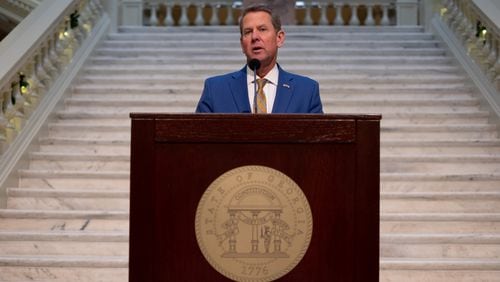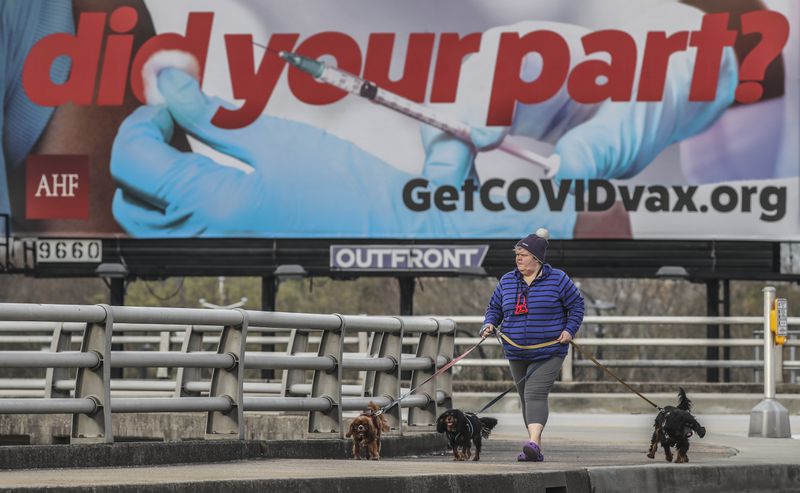Gov. Brian Kemp has long opposed mask requirements to combat the spread of coronavirus. And his stance isn’t changing after the U.S. Centers for Disease Control and Prevention urged Americans to return to wearing masks indoors in areas where the disease is surging.
Kemp, who has pushed Georgians to get vaccinated, said he will continue to urge residents to wear masks where appropriate but oppose any mandate for them to do so. That lines up with his approach throughout the pandemic, one that included a legal battle with Atlanta officials over an effort to require masks in the capital city.
“Georgia will not lock down or impose statewide mask mandates,” said Kemp, urging Georgians to “get vaccinated as quickly as possible.”
That hasn’t stopped a growing number of local officials from taking their own steps to curb the spread of the disease. Late Wednesday, Atlanta Mayor Keisha Lance Bottoms ordered that masks should be worn in all indoor public spaces, including private businesses.
According to CDC data, all but about a dozen of Georgia’s 159 counties meet the threshold for substantial or high community transmission. The only counties that don’t meet CDC’s threshold for recommended mask use are: Butts, Clay, Gilmer, Glascock, Jefferson, Lanier, Macon, Oglethorpe, Towns, Upson and Wilcox.
The CDC issued the new guidelines amid a worldwide surge of coronavirus cases that began hitting Georgia this month, much of it driven by the highly contagious delta variant that’s quickly spreading among the unvaccinated.
Georgia’s seven-day rolling average of probable and confirmed coronavirus cases is at its highest point since March 5 and more than eight times higher than it was before the July 4th holiday, according to state data. Meanwhile, the pace of vaccinations has slowed, hovering at 40% fully vaccinated statewide.
Kemp no longer has the authority to impose a statewide mask mandate. He ended the public health state of emergency last month that gave him broad powers to enact statewide restrictions. But he still has one of Georgia’s loudest megaphones and can impose rules for state employees and offices.
Credit: John Spink / John.Spink@ajc.com
Credit: John Spink / John.Spink@ajc.com
In recent weeks, he’s joined other Republican governors in casting requirements as an assault on personal liberties. He’s signed an executive order that restricts the use of “vaccine passports” and another that opposes school mask mandates.
He’s more recently huddled with Dr. Kathleen Toomey, the head of the Department of Public Health, to discuss coronavirus strategy and held a call with the leaders of metro Atlanta hospitals, which have been experiencing an uptick in coronavirus cases.
Kemp said, “Georgians know the risks and they know these safe, effective vaccines are our greatest tool to defeat Covid-19.”
Some local politicians have taken matters into their own hands.
A growing number of k-12 systems are requiring masks, including Gwinnett County, Georgia’s largest school district. And this week Savannah became the first city in Georgia to reinstate some mask requirements.
“I’d hope the governor would focus on getting more people vaccinated and find ways to keep people safe in Savannah,” said that city’s mayor, Van Johnson. “If wearing a mask is a way to do that, it’s worth it.”
The CDC’s guidelines cited new information about the spread of the delta variant among vaccinated people. Those “breakthrough” infections generally cause milder illnesses. The CDC also recommended indoor masks for teachers, staff and students, regardless of vaccination status.
Nationally, some public officials immediately enacted the guidance, including leaders in Illinois and Nevada. The governors of Arizona and Texas, meanwhile, staunchly opposed the guidelines, criticizing them as an example of the White House’s inability to fight the pandemic.









